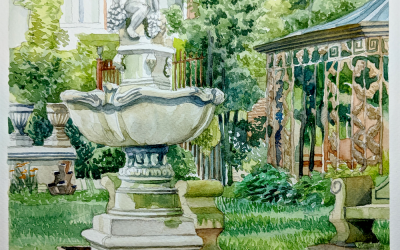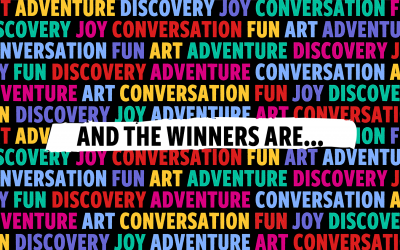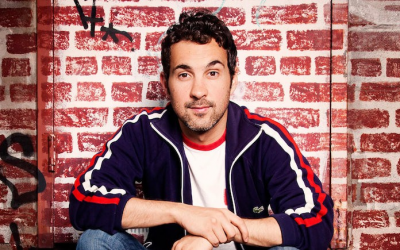
Dick Guttman & wife Gisela
What do Barbra Streisand, Audrey Hepburn, Jay Leno, Clint Eastwood, Gene Hackman, Elizabeth Taylor, Warren Beatty, and Goldie Hawn have in common? Superstardom aside, all of these stars have chosen Dick Guttman to represent them as their publicist. Dick’s 60+ years as an in-demand publicist inspired him to write Starflacker: Inside The Golden Age Of Hollywood, a memoir full of stories about working with some of Hollywood’s biggest stories.
Downtown had the pleasure of speaking with Dick a few months ago, and that telephone conversation had lots of leftover wisdom. In turn, it was only right to post Part 2 of our Q&A; Part 1 can be read here.
Another Huffington Post piece of yours hints at old Hollywood coming back, and you’ve mentioned in interviews things that were better about old Hollywood. But what are some of the things that you think are better these days about how Hollywood works? Is there anything?
Dick Guttman: I think there must be. (laughs) Really the strange thing is the film that served end of the Golden Age was one of the best movies of old time, Star Wars. It had all the conventional things that a good movie had with real compelling characters and really strong narratives and wonderful comedy…but it was the first film that sort of showed that the visual imagery…You know there will be Star Wars sequels forever just like there’s Batman sequels forever, and I think that it distracted Hollywood from the concept of introducing really compelling people…I mean, they still make wonderful movies…
Do you have any hobbies away from Hollywood? Or have movies always been your career and your passion?
Dick Guttman: This is really embarrassing, and I think it’s the latter…one of my hobbies is etymology. I love to read dictionaries and I love to know how words are constructed. It’s really astonishing. I was looking up the definition and the derivation of “atonement.” That’s an interesting thing…It doesn’t come from Latin or anything else, it comes from a Middle English phrase for they had a phrase that was “at-one-ment,” the state of being at one within yourself. So it was really not “atonement,” it was “at-one-ment”…I remember in French class we were talking about, it is a very important word, “remorse”…That’s great if you can actually make discoveries that nobody else knows about.
Sure, and I’m sure you’ve been to New York hundreds of times for press trips and business. Do you have any favorite restaurants here?
Dick Guttman: Actually I haven’t been there as often as you’d think…The last trip, Turner Classic Movies invited me to be a guest programmer. Well that was a greatest honor I could ever receive…My most interesting trip, my wife was with me and Freddie Fields, who was the head of MGM…He said, “Are you guys doing anything tonight because I’ve got this kid Mel Gibson here. He is in the film, he doesn’t know anybody, could you take him to dinner?” It was a really interesting thing because he was so insular, very sweet actually.For that reason I remember the Odeon restaurant in SoHo, and the one place I would go for quite often I have a really good memories is the Russian Tea Room.
Oh yeah, on 56th Street…
Dick Guttman: Yeah, it just seemed to be an interesting place where interesting things happen. It was where in the film that Dustin Hoffman where he was transgender…
Tootsie?
Dick Guttman: Tootsie, yeah, they stage this great scene with Sydney Pollack there. For me, out here it was the Hollywood Brown Derby, because when I was a kid I would do two or three interviews there every week. It was really a holy place and you go in there and there would be Joan Crawford and there would be Errol Flynn and there would be George Stevens and all these great people would gather there. It’s where Lucille Ball stalked Bill Holden, you know it was famous for that, and so it’s turned out that it was torn down. I’ve been very much involved in an effort to return filmmaking to Hollywood. I mean, it’s tragic for me that I grew up and you would go to MGM and on stage 25 and all the great films are shooting there. You walked among the giants.
Because of that we started a new tradition called Made in Hollywood Honors when I was handling The Artist…I wanted a really great place to stage it and my daughter is sort of the managing partner of a very famous apartment building, luxury apartment building in Hollywood at the corner of Hollywood and Vine, 1600 Vine. 1600 Vine was the address of the Hollywood Brown Derby, and so I said, “You know darling, you have an obligation here, you sit on one of the greatest holy places in Hollywood. Let me use your facilities and your terrace.” She sponsored it. 1600 Vine is the sponsor of these awards which we give every year…That Honors ceremony is kind of my hobby and we’ll get people back here.
That’s wonderful that you found a way to give back, that’s not just a typical fundraiser or just the self-congratulatory way. You’re giving back to actually rewarding the people who keep the business there…
Dick Guttman: Last year we wanted to expand that and give a lifetime achievement not to people for their excellence but for their dedication to Hollywood and all that. So we chose John Williams. Williams scored 70 films…There may have been a couple he didn’t score here but almost all of them were then with Hollywood musicians. Hollywood made an incredible contribution to music because in the 1930s, when so many great composers of the century were forced to leave Europe to come here, it gave them a place to practice their craft…He won many Academy Awards and his scores were fantastic, but he had a very volatile personality, which I enjoyed.
So finally, Dick, any last words for the kids?
Dick Guttman: When they allowed me to do the Turner Classic Movies event, the last question to me was, “If you were starting over, would you do it again? Would you have made the same decision? Gone on with the same profession?” I’d never been asked and I had never thought of it and I said, “No.” It just struck me as strange but the answer was no because it’s lost the human component. It’s not as strong as it was.
I wrote Starflacker because I worked with probably 300 of the greatest talents of film history, and each one of them was a unique personality, and you know funny in his own way or her own way, remarkable, loveable…
I think I wanted to go into publishing. I’d never heard of publishing, I just got a job as an office boy at Rogers & Cowan, but when you find your North Star, you go after it, so I just loved what I did. You know there were aggravating times, talented people can be quite severe in their relationships with people, but I was in love with the people who made that great form of literature that was of our century. The 20th century gave the world visual literature that could be transported. Theater has been there since the Greeks and I’m sure long before, but motion picture had a common language and I was really proud to be part of it…I love the show, I love the business, these people who are funny, you can’t ask for more than that.













